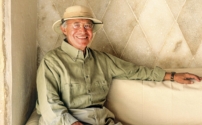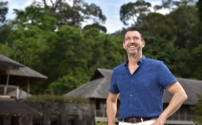12071
TotalViews
Banyan Tree Hotels & Resorts is built on a foundation of sustainability and has grown into one of the world’s leading international operators that manages more than 40 resorts and hotels, 60 spas, 70 retail galleries and three championship golf courses in 28 countries. We asked Claire Chiang, Senior Vice President of Banyan Tree Holdings and Chairperson of Banyan Tree Global Foundation for her thoughts on sustainability and how she ‘walks the talk’.
Do travellers care about sustainability?
Yes, they do. As hotel operators, we have to do our part. Banyan Tree developed a Citizens’ Science programme to share information with our guests on our sustainability efforts and engage them with activities to influence their mindsets. This mutual reinforcement effort sparks a journey in nurturing stewardship care based on an understanding of the ecology and the community. What you know, you cherish; what you cherish, you defend.
Is the hotel industry really serious about addressing sustainability?
Yes and no. Like any industry, there are leaders, laggards, and those leveraging the “optics” of sustainability. That said, the leaders are not only passionate and active about it, but they are investing into sustainability programmes. Enlightened leaders see sustainability not as a cost, but as a long term investment.
As a socially responsible business, Banyan Tree was founded with the core value of driving sustainable development. We see sustainability in terms of not only the environment but also the communities we operate in. This has been Banyan Tree’s ethos and continues to be our guiding principle. Our triple bottom line (financial, social and environmental) helps direct the company’s sustainable development by inspiring associates, guests, and partners to take a wider consideration encompassing a long term view when making business decisions.
What do you see as the leading trends in sustainability for the hotel industry?
Transparency and Experiences. Hotel guests expect greater transparency to know that their gestures, for example, reuse of towels and the forgo of daily freshly laundered sheets, is matched by genuine conservation efforts. During their stay at our resorts, we noticed that guests actively seek to make a positive impact by doing good for the host community and environment. Sustainability activities such as visits to the local orphanages, beach clean-up, tree-planting or even giving language classes to underprivileged children are organised at our resorts – offering guests the opportunity to give back.
We encourage guest interactions with the local community and natural surroundings through our Stay for Good initiative. It is the platform encompassing all our sustainability efforts where we encourage our guests to get involved through key initiatives that all our 41 hotels & resorts participate in.
What bothers you most within the sustainability discussion?
Greenwashing – This happens when more effort is put into generating publicity about sustainability measures and campaigns than putting it into practice instead.
What do you see as the biggest urgency for the planet?
Compassion – We need more compassion for our fellow inhabitants of the planet. Be it compassion for someone of a different race, language or religion, every living creature is being impacted by our consumption practices. It must be NOW that we choose wisely and live with a sense of compassion for the greater good and for generations to come.
What legacy would you like to leave behind from your leadership?
In all the business decisions I make, I ask how Banyan Tree has made a difference to the host community and what we leave behind that will value add to the development of the destination. This is a value-based perspective which shapes our leadership mindset that is beyond economics. It involves raising questions in the industry related to the way we do business ethically, how we embrace diversity and inclusiveness in the way we recruit and motivate, and build community resilience and trust by strengthening stakeholders’ resources and capabilities. In short, I hope Banyan Tree exercises stewardship as a central concern in its development role; we not only create wealth, we create value for society to safeguard and enhance the interests of all stakeholders. I hope to be remembered for this meaningful and purposeful commitment.
What did you want to be when you grew up?
I had so many passions and there could have been many possibilities. I would have continued with my teaching profession, but destiny changed course when I met an elderly woman who was a champion of women’s rights and got me on to establishing Banyan Tree Gallery. Her name was Shirin Fozdar, she was in her late 80s. For those who may not have heard of her, she was a Parsi woman, an early educator and champion of women’s rights, who with other women in Singapore, fought for our Women’s Charter in 1961. Mrs Shirin Fozdar was inspiring in her selfless and infectious optimism in realising other people’s dreams. It was my late father-in-law, Mr Ho Rih Hwa who introduced her to me. Four decades back, he had donated typewriters, scholarships and vehicles to support her cause in poorer North Eastern part of Thailand at Yasathon. She came to me in the late 80s and lifted my eyes to village craft as a viable revenue source for village women. She took an overnight bus to meet me in Bangkok, and showed me two triangular cushions made by the Yasathon girls. She told me two cushions could help to place a girl child in school. I thought if I bought more to furnish our hotels, I could support a whole village. I believe like Mrs Fozdar, that education and employment are the best safeguards against prostitution and poverty. A few years later I quit University teaching at NUS and started the retail business in our hotels, focusing on vanishing craft and handiwork done by rural women. Two cushions changed my career and started my journey in business.
Which is your favorite hotel, apart from your own, and why?
It depends on who I travel with, for what purpose, the duration of stay, and the purpose of the visit. It is not a fair question for me, as I will say Banyan Tree hotels are all my favourite, like my children. I am evidently most familiar with our group of hotels in Laguna Phuket and Bangkok, as they have become destinations for work, play and rejuvenation.
Give us an example of how you, in your personal life, walk the talk?
Changing my life course from academia to business, and setting up the Banyan Tree Gallery to support and promote more than 80 handicraft communities in the region are the best testimonies to me walking the talk. When most businesses commit to corporate social responsibility as a form of philanthropy, I had set up the Banyan Tree Global Foundation in 2009, in a belief that the role of business is in maximising and creating value for various stakeholders in the long run. This process of engagement shapes the ethos of shared responsibility to developing the necessary social capital in sustainable communities. By matching and aligning a corporation’s core competences with local needs, we create a greater impact that is mutually reinforcing. Businesses are not here to only make money; their role is to also be part of a community, take responsibility, and walk the talk of upholding ethical principles to enhance the quality of life for all.






 180 Seconds with Mounir Neamatalla
180 Seconds with Mounir Neamatalla 300 Seconds with Arnaud Girodon
300 Seconds with Arnaud Girodon 15 Minutes with Eva and Sonu Shivdasani
15 Minutes with Eva and Sonu Shivdasani 300 Seconds with Marco Poletto
300 Seconds with Marco Poletto